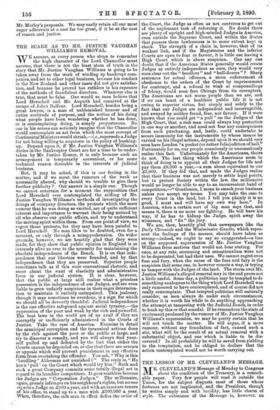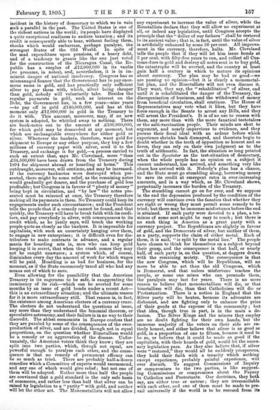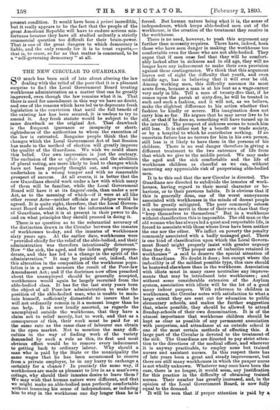THE LESSON OF MR. CLEVELAND'S MESSAGE.
MR. CLEVELAND'S Message of Monday to Congress about the condition of the Treasury, is a remark- able paper. Very few people will read it outside the Union, for the subject disgusts most of those whose fortunes are not implicated, and the President, though he writes simply and with lucidity, has little charm of style. The substance of the Message is, however, an Incident in the history of democracy to which we in vain seek a parallel in the past. The United States is one of the richest nations in the world ; its people have displayed a quite exceptional readiness to endure taxation ; and its credit is consequently able to bear, without feeling them, shocks which would. embarrass, perhaps paralyse, the strongest States of the Old World. In spite of the mad expenditure upon pensions, of a heavy debt, and of a tendency to grants like the one just voted for the construction of the Nicaragua Canal, the Re- public has a surplus of £12,000,000 in its vaults (we presume, in notes), and, nevertheless, it is in im- minent danger of national insolvency. Congress has so mismanaged finance that the Government has to pay enor- mous sums in gold, and has practically only sufficient silver to pay them with, which, silver being cheaper than gold, nobody will voluntarily take. Besides the regular payments in gold, such as interest on the Debt, the Government has, in a few years—nine years —to pay off in gold £140,000,000, and has at this moment only £12,000,000 in gold in the Treasury to do it with. This amount, moreover, may, if no new system is adopted, be whittled away to nothing. There are bank-notes out to the amount of £100,000,000, for which gold may be demanded at any moment, but which are exchangeable everywhere for either gold or silver. Whenever the bankers, therefore, want gold for shipment to Europe or any other purpose, they buy a few millions of currency paper with silver, send it to the Treasury, and exchange it for gold,—a process carried to such an extent that, says Mr. Cleveland, more "than £34,500,000 have been drawn from the Treasury during 1894 for shipment abroad or hoarding at home." This outdraught, moreover, will continue, and may be increased. If the currency banknotes were destroyed when pre- sented, there might be some relief, as the remaining notes would gradually get dearer, and the purchase of gold less profitable; but Congress is in favour of "plenty of money " being kept in circulation, and " by law " the notes pre- sented must be reissued at once, the Treasury therefore making all its payments in them. No Treasury could keep its engagements under such circumstances ; and the President tells the people that if a remedy cannot be found, and that quickly, the Treasury will have to break faith with its credi- tors, and pay everybody in silver, with consequences to its credit which, as he justly says, will touch the working people quite as closely as the bankers. It is impossible for capitalists, with such an uncertainty banging over them, to engage in new enterprises ; it is difficult even for dis- tributors to make contracts in advance, and a regular mania for hoarding sets in, men who can keep gold keeping it in secret, that when the crash comes they may not be caught unawares ; a system which, of course, diminishes every day the amount of work for which wages will be paid. Hoarding is as bad for business, for the moment, as if the State enormously taxed all who had any means out of which to save.
Even allowing for the possibility that the American Treasury in its eagerness to be safe, is exaggerating the imminency of its risk—which can be averted for some months by an issue of gold bonds under a recent Act— this is an extraordinary situation; and the ultimate reason for it is more extraordinary still. That reason is, in fact, the existence among American electors of a currency craze. The electors do not understand the questions at issue, any more than they understand the binomial theorem, or speculative astronomy, and their failure is in no way to their discredit. The ablest economists in Europe confess that they are puzzled by some of the consequences of the over- production of silver, and are divided, though not in equal proportions, on the question whether Bimetallism would be a remedy or an aggravation of the disease. Unfor- tunately, the American voters think they know ; they are split into two parties, which, though not equal, are powerful enough to paralyse each other, and the conse- quence is that no remedy of permanent efficacy can be so much as tried. There are probably half-a-dozen remedies which a Committee of experts would recommend, and any one of which would give relief; but not one of them will be adopted. Rather more than half the people are convinced that a gold standard is the only safe basis of commerce, and rather less than half that silver can be raised by legislation to a " parity " with gold, and neither will let the other act. The Monometallists will not allow any experiment to increase the value of silver, while the Bimetallists declare that they will allow no experiment at all, or indeed any legislation, until Congress accepts the principle that the " dollar of our fathers " shall be restored to its ancient value ; that is, in fact, until the value of silver is artificially enhanced by some 50 per cent. All improve- ment in the currency, therefore, halts. Mr. Cleveland tells the people that if they will let him issue bonds at 3 per cent. with fifty-five years to run, and collect all Cus- toms-dues in gold and destroy all notes sent in to buy gold, the catastrophe will be averted, and the country at least gain half a century in which to mature its opinions about currency. The plan may be bad or good—we are passing no opinion—but it is clearly a monometal- list plan, and the Bimetallists will not even discuss it. They want, they say, the " rehabilitation" of silver, and until it is rehabilitated the danger of the Treasury, the disorganisation of business, and the withdrawal of money from beneficial circulation, shall continue. The House of Representatives may vote what it likes, but they have force enough in the Senate to arrest any Bills, and they will arrest the President's. It is of no use to reason with them, any more than with the more fanatical teetotalers or the anti-vaccination people. Their minds are shut to argument, and nearly impervious to evidence, and they pursue their fiscal ideal with an ardour before which experience shrinks back dismayed, and theorists begin to doubt whether in the teeth of opposition so honest and so fierce, they can rely on their own judgment as to the truth of arithmetic. In fact, the situation so long pointed out in the Spectator as the test-situation of democracy, when the whole people has an opinion on a subject it cannot understand, has arrived, and something very like chaos has arrived with it. Nobody's plan has a chance, and the State must go stumbling along, borrowing money to save its credit at emergent rates in ever-increasing amounts, and in a way which, as Mr. Cleveland shows, perpetually increases the burden of the Treasury. The stumbling cannot go on for ever, and we suppose in the end the depression produced by the condition of the currency will convince even the fanatics that whether they are right or wrong they must permit some remedy to be tried; but there may be immense misfortunes before the end is attained. If each party were devoted to a plan, a ter- minus of some sort might be easy to reach ; but there is no such thing in America as a great party with a currency project. The Republicans are slightly in favour of gold, and the Democrats of silver, but neither of them, as a party, supports the claim of either metal. Each of them, it is said, " is split by the metal line." The people have chosen to think for themselves on a subject beyond their grasp, and the consequence is that half, or nearly half, of each party is, on this question, at daggers drawn with the remaining moiety. The consequence is that the new Congress, which will be Republican, will no more be able to act than the old Congress, which is Democrat, and that unless misfortune teaches the people, or some one arises who can persuade them, the paralysis may last for years. There is no more reason to believe that monometallism will die, or that bimetallism will die, than that Catholicism will die or Protestantism. There is a notion in England that the Silver party will be beaten, because its advocates are dishonest, and are fighting only to enhance the price of their goods at the expense of the community ; but that idea, though true in part, is in the main a de- lusion. The Silver Kings and the miners they employ are no doubt fighting for their own hands, but the immense majority of the voters on their side are en- tirely honest, and either believe that silver is as good as gold, in a proportion of one to fifteen, because it used to be so, or believe that it could be made as good if the capitalists, with their hoards of gold, would let the neces- sary legislation pass. As they also believe that, if silver were " restored," they would all be suddenly prosperous, they hold their faith with a tenacity which nothing except experience, probably painful ri expeence, will ever disturb. To suggest Commissions. of Inquiry or compromises to the two parties, is like suggest- ing Commissions or compromises about the Papacy to Catholics and Protestants. Our doctrines, they both say, are either true or untrue ; they are irreconcilable with each other, and one of them must be made to pre- vail universally if the world is to be rescued from its present condition. It would have been a priori incredible, but it really appears to be the fact that the people of the great American Republic will have to endure serious mis- fortunes because they have all studied ardently a strictly commercial question too difficult for their brain-power. That is one of the great dangers to which democracy is liable, and the only remedy for it is to trust experts,— that is, to cease, so far as that matter is concerned, to be a "self-governing democracy" at all.




































 Previous page
Previous page